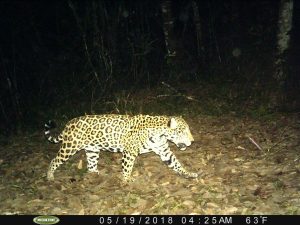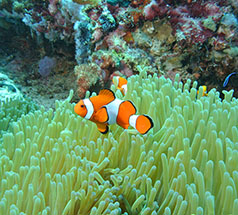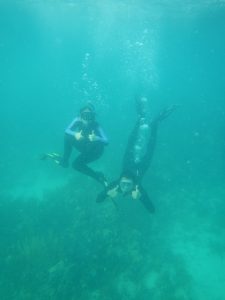Tropical rain forests and the coral reefs are not only textbook examples of high levels of biodiversity, but are picturesque ecosystems that the world at large has accepted as exotic and fantastic. Think of the Red-eyed Tree frog and the Clownfish swimming above sea anemone.
These were the images that came to mind when I prepared myself for Belize. Things we only see on nature documentaries will finally be seen by our naked eyes, I expected.
Although I did not get to see either of these popular symbols of the ecosystem I was in, I saw many other species that were simply awe-striking. 5 years from now, I bet, I will still remember the first photo of a jaguar on our camera trap, and our immediate screaming chorus.

Also, I will remember the coral snake that emerged from its home underneath a log as I turned it over. And, the boa constrictor that Adrienne was too busy to see. And, the unexpected contact between my hands and the warmth that radiated from the trash dump of Leaf-cutter ants. These close engagements with other lifeforms are among some of my favorite experiences from this class.
As much as we joke about being elite gentlemen naturalists of the 1800’s, many of us were simply in awe at the amount and different types of life we got to experience. Like some of them, we set out to categorize and zero-in on the type of species we were seeing. Veronica’s incessant hunt for the Blue Morpho can be likened to past naturalist’s desire to collect specimen for further study, or to simply show the world. Being in proximity to these alien (to us) lifeforms, it was like exploring a new world.
Or new worlds. Although the tropical rain forest and the coral reefs shared many similarities (such as dependence on microbial-plant interactions, abundance of solar energy and large energy output), they were different.
Much of the life in coral reefs depended on water for movement. Many species of plant and animals rely on the dispersal ability of water for survival. Water carries the reproductive cells of many species and gametes are formed in open water. Sea urchins uses powerful wave energy to move from place to place. In the tropical rain forest, the relative lack of wind means that most movements must be provided by individual organisms.
We also felt this first hand. Although snorkeling and hiking both are actively tiring activities, with snorkeling one can simply float and carried by the waves. If there is only one lesson I learn from being in the ocean, it is that I need more of it in my life. Having gone from being afraid of water to being in love with it, I feel at ease in this new element in such a way I have never felt before. This was totally unexpected, too. These new worlds at the very least gave me new experiences. Though I would willingly opt-out of the sand fly experience. That sucked.
Seeing a new world has its biases. We developed a search image for the “exotic” and for certain species we come in with expectations to see. It’s interesting that as a group we had such wild reactions to the jaguar but only showed only slight amusement or even annoyance to orchid bees. Both species offer necessary ecosystem services though it seems our predisposition towards mammals biased us against non-mammals. I wonder if I would have a different or better experience if we were able to develop more fully our appreciation for species we had less appreciation for going in.
Coming out Belize and into Houston’s concrete jungle, I haven’t been as awe-striken by lifeforms here. But I think back to a paper by William Cronin titled “The Trouble with Wilderness; or, Getting Back to the Wrong Nature”. He tells us that there is wildness and nature in every place.
“Wildness (as opposed to wilderness) can be found anywhere: in the seemingly tame fields and woodlots of Massachusetts, in the cracks of a Manhattan sidewalk, even in the cells of our own bodies. As Gary Snyder has wisely said, “A person with a clear heart and open mind can experience the wilderness anywhere on earth. It is a quality of one’s own consciousness. The planet is a wild place and always will be.”
Although it might easier to spend thousands of dollars on a trip to see cool nature, ecotourism has its negatives. It can prevent us from seeing interesting lifeforms (that is all lifeforms) in our backyard and in our bodies. I am not sure how my thinking about wilderness will change in 5 years, but at least for right now, I think it is my challenge to incorporate the experience of Belize into my everyday life, much like continuing the sense of meditation after meditating.



